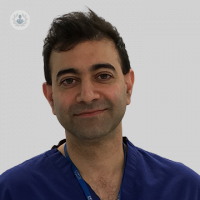Understanding pelvic pain in women: Causes, symptoms, and treatment options
Written by:Pelvic pain is a common and often distressing issue experienced by many women. It refers to any discomfort or pain felt in the lower abdomen, pelvis, or genital area. Understanding the causes, symptoms, and available treatment options can help alleviate anxiety and guide you towards appropriate care. In this article, we hear expert insight from highly esteemed consultant gynaecologist Mr Ilyas Arshad on the various aspects of pelvic pain, its potential causes, and steps you can take to manage it effectively.

How is pelvic pain defined?
Pelvic pain can manifest in different forms, ranging from a dull ache to sharp, stabbing sensations. It may be intermittent or continuous, and its intensity can vary from mild to severe.
Pelvic pain can originate from various structures within the pelvis, including the reproductive organs (such as the uterus, ovaries, and fallopian tubes), urinary system, digestive system, or musculoskeletal system.
What are the potential causes of pelvic pain?
There are a wide range of potential causes of pelvic pain, which can be broken down into four categories: gynaecological conditions, urinary conditions, gastrointestinal issues and musculoskeletal factors.
Gynaecological conditions
- Endometriosis: the tissue lining the uterus grows outside of it, causing pain and inflammation
- Pelvic inflammatory disease (PID): an infection of the female reproductive organs, often caused by sexually transmitted infections
- Ovarian cysts: fluid-filled sacs that can develop on the ovaries and occasionally cause pain
Urinary conditions
- Urinary tract infections (UTIs): infections in the urinary system that can cause pelvic discomfort
- Interstitial cystitis: a chronic condition characterised by bladder pain and urinary urgency
Gastrointestinal issues
- Irritable bowel syndrome (IBS): a common digestive disorder associated with abdominal pain, bloating, and altered bowel habits
- Inflammatory bowel disease (IBD): chronic conditions like Crohn's disease and ulcerative colitis that can lead to pelvic pain
Musculoskeletal factors
- Muscular imbalances: Weak or tight pelvic floor muscles can contribute to pelvic pain
- Pelvic joint dysfunction: Misalignment or instability in the pelvic joints can cause discomfort
When should you see a doctor?
If you experience persistent or severe pelvic pain, it's important to consult a healthcare professional. They will conduct a comprehensive evaluation to identify the underlying cause. This may involve a detailed medical history, physical examination, and additional tests such as ultrasound, blood tests, or imaging studies.
How is pelvic pain treated?
The treatment of pelvic pain depends on its underlying cause and may involve a multidisciplinary approach. Some common treatment options include:
Medications
Nonsteroidal anti-inflammatory drugs (NSAIDs) may be used for pain relief in cases of pelvic pain. Where gynaecological conditions are found to be behind pelvic pain, hormonal medications, like oral contraceptives or hormone replacement therapy, may be indicated.
Physical therapy
Pelvic floor exercises can be used to help strengthen and relax the muscles in order to relieve pain. Additionally, manual therapy techniques can be used to address muscular imbalances and joint dysfunction.
Lifestyle modifications
Patients suffering from pelvic pain can use stress management techniques, such as relaxation exercises or counselling to help them manage their symptoms. For gastrointestinal symptoms, some dietary changes can also be helpful.
Surgical Intervention
In some cases, surgery may be necessary to address specific gynaecological conditions or pelvic abnormalities.
While pelvic pain can be challenging to manage, understanding its potential causes and treatment options can empower you to seek appropriate care. Remember, timely medical evaluation is crucial to accurately diagnose the underlying cause of pelvic pain. With the help of healthcare professionals, you can develop an effective treatment plan to minimise discomfort and improve your quality of life.
If you are struggling with symptoms of pelvic pain and wish to schedule a consultation with Mr Arshad, you can do so by visiting his Top Doctors profile.


